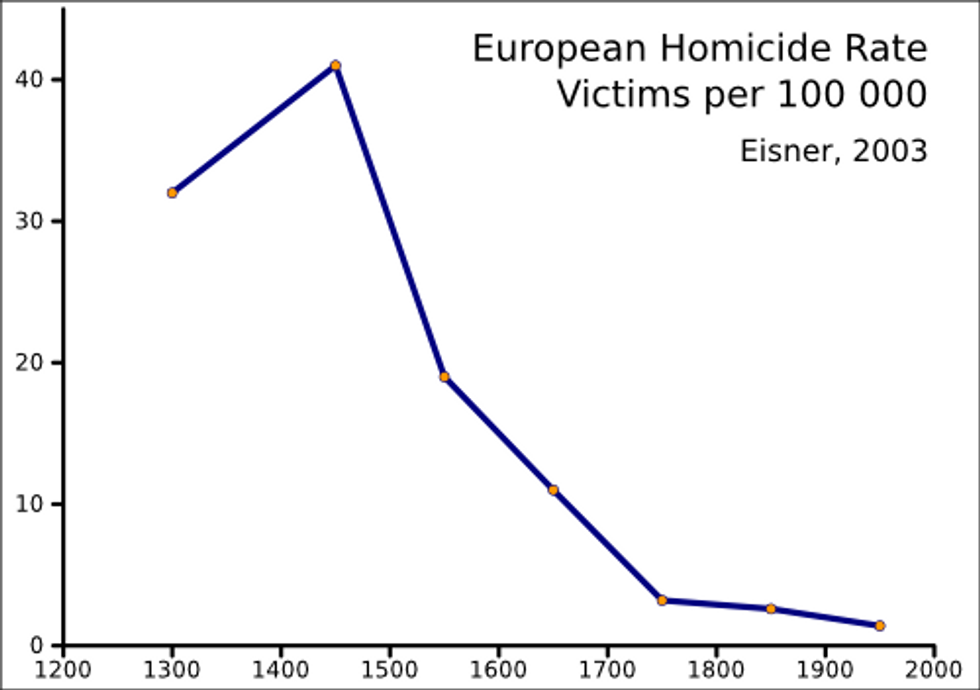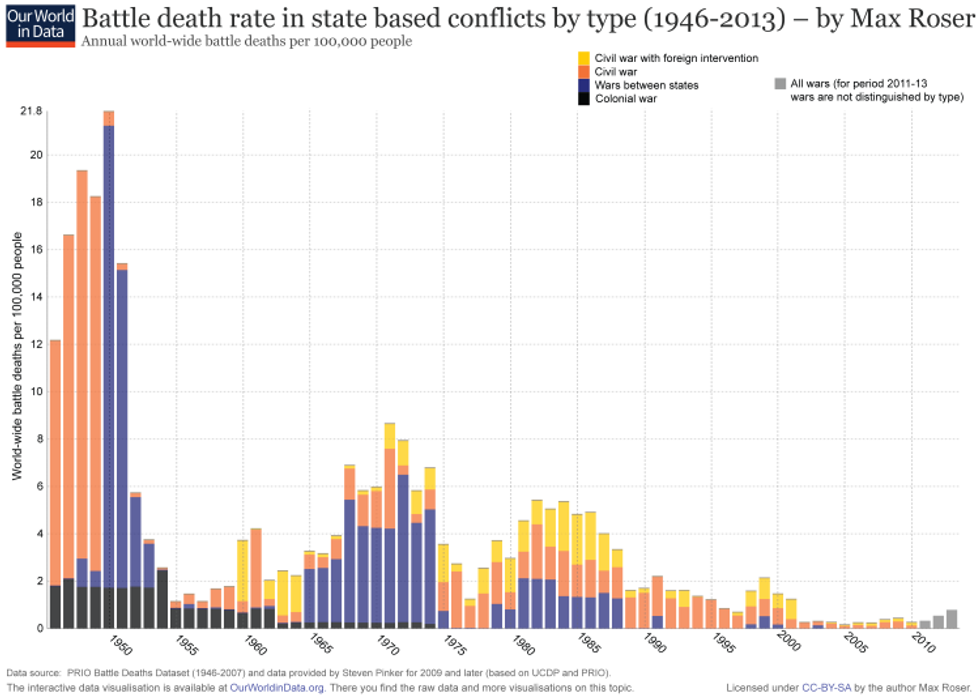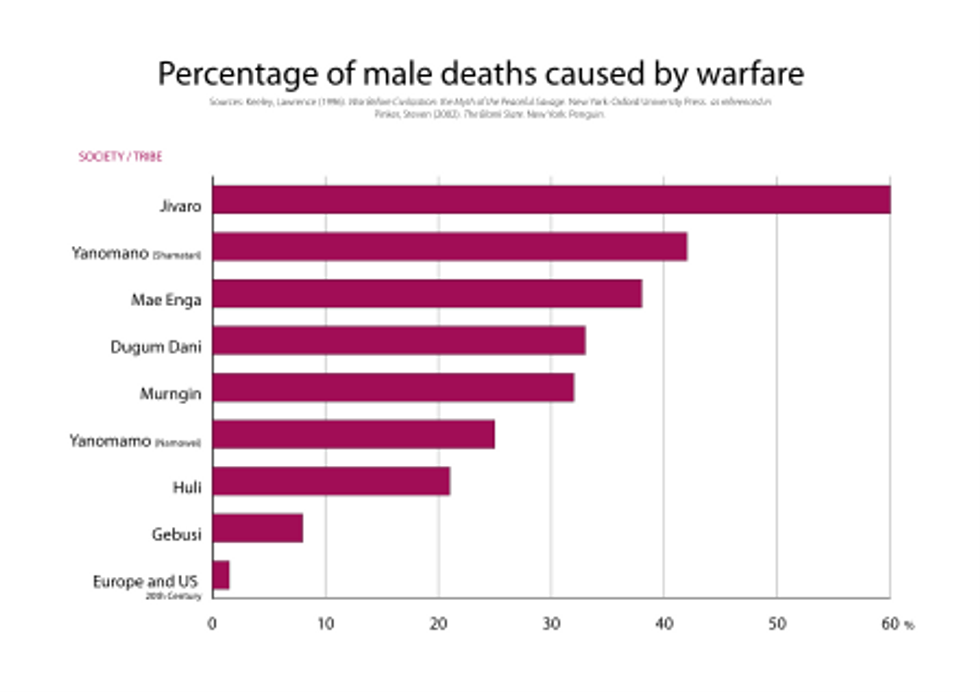Within the last few months, the global community has been shocked by a number of horrifying terrorist attacks that left hundreds of innocent people dead. When we hear about so many tragedies, and since there are so many we never hear about, can anyone be blamed for thinking that the world has gone to hell in a handbasket since the Good Ol' Days™? As fellow Odyssey writer Janelle Honeycutt describes it, "it seems like the world is falling apart."
The key word in that sentence, though, is "seems." After all, the truth is a counterintuitive but pleasant surprise: human violence has been declining for hundreds of years. Let's dig into some numbers...
The American homicide rate has been declining for hundreds of years. Incidentally, the European homicide rate has been doing the same thing for even longer:
Similar trends have been recorded in Mexico, Japan, and all across the world over the last century or so, especially when it comes to armed conflicts:
You might have heard the 20th century described as "the deadliest period in world history" because of how many people died in atrocities like the Holocaust and Communist genocides. But, contrary to popular belief, those kind of atrocities were common in the past and even worse in their scope. For instance, the Christian Crusades had over 100 times the genocide rate of the Holocaust, killing roughly one percent of the entire global population compared to the less than 0.01% killed in Hitler's concentration camps. The Crusades had almost 40 times the rate of World War II and over 60 times the rate of Chairman Mao's purges in China.
It is true that those 20th century atrocities have killed more people in total than ancient ones such as the Crusades, but that is primarily because there were more people to kill. After all, the global population reached one billion less than two centuries ago and is over seven billion today. Measuring violence over time in raw numbers instead of as a percentage of the population is very misleading. After all, would you rather live in a city with only 1,000 people and 100 killings per year or a city of 1,000,000 people and 200 killings per year? Humans lived in the first city thousands of years ago, but we are lucky enough to live in the second city today.
An ancient but persistent myth claims that humanity lived in pure harmony with nature before being corrupted by civilization, and contradicts the idea of declining violence. It dates back to the ancient Romans, although the Romantic movement resurrected it in the form of the "noble savage": a stock character who grew up outside of civilization and embodies the innocence of nature.
As it turns out, that myth is a myth. Historical evidence shows that pre-civilization societies were anything but innocent, with huge percentages of men dying from tribal warfare:
All of those bars represent various pre-civilization societies — except one. That tiny rectangle at the bottom represents the US and Europe during the 20th century. Even including both World Wars, the percentage of male warfare deaths in Europe was less than pre-civilization societies by a factor of 20.
The decline of violence is certainly not limited to homicide and genocide, though, since trends in violence against women, US executions and growth of democracy give reason for optimism.
Why is it happening, though? Have we all just decided to be less mean to each other or something? Well ... kind of. A variety of explanations have been proposed for the decline in violence. One of these is the aforementioned rise in democracy, since democracies don't (usually) fight each other. Another is the end of colonialism -- fewer explorers are going around and subjugating foreigners at gunpoint. Other factors include the increase in economic interdependence between countries as a result of international trade, increased economic development, international peacekeeping efforts and the rise of Enlightenment values such as logic, technology, order and progress.
The fact that more tragedies are being reported in the news is actually not a sign that things are worse than before. After all, there are not more tragic killings today than in the past -- we simply know about more of them. Tragedy in the news is a sign of improvement, since it allows us to have more sympathy for the suffering of people we have never met.
Independently of which factor is the most significant cause of the slow death of killing, though, we can take comfort in the knowledge that humanity has been improving as we work together to build civilizations free from violence and instability:
The decline [of violence] has not been steady; it has not brought violence down to zero; and it is not guaranteed to continue. But it is a persistent historical development, visible on scales from millennia to years, from world wars and genocides to the spanking of children and the treatment of animals.
For more information on this subject, I recommend checking out some of the work by Harvard cognitive scientist Steven Pinker. This includes...
his 20-minute TED Talk ("The Surprising Decline in Violence"),
his 800-page book with 100 graphs and data sets ("The Better Angels of Our Nature: Why Violence Has Declined"),
the online FAQ for that book,
and an article he wrote more recently ("Has the Decline of Violence Reversed Since The Better Angels Of Our Nature Was Written?").

























